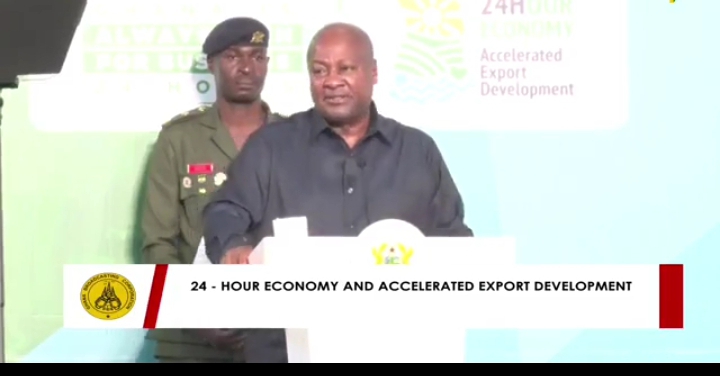By Ab.teye
Ghana has set its sights on a major economic transformation as President John Dramani Mahama officially launched the 24-hour economy and Accelerated Export Development Programme in Accra on Tuesday.
The ambitious initiative aims to shift the country from its long reliance on exporting raw materials towards value-added production, large-scale job creation, and a more resilient, export-driven economy.
Speaking at the launch, Mahama described the programme as a comprehensive strategy to “unleash productivity, drive exports, and expand economic opportunities” across sectors. He noted that Ghana’s traditional model of exporting raw commodities while importing finished goods has hindered local growth and left many young people without decent jobs.
“Between 2016 and 2020, it became increasingly clear that Ghana, like many African countries, is trapped in a cycle that enriches others while stifling local opportunities,” Mahama said. “We are determined to break that cycle and position Ghana as a globally competitive industrial nation.”
A central feature of the new strategy is the Volta Economic Corridor, which seeks to develop the full potential of the Volta Lake through agriculture, aquaculture, tourism, and transport. Plans include irrigating more than two million hectares of land, establishing agro-industrial parks, and transforming the lake into a major logistics route.
The 24-hour economy framework also introduces eight targeted sub-programmes, ranging from agriculture and manufacturing to creative industries and civic engagement. According to Mahama, these programmes are designed to support round-the-clock operations, reduce import dependence, and accelerate export growth.
Highlighting the importance of governance and coordination, presidential advisor Goosie Tannoh outlined measures being taken to align the new programme with existing government projects.
“We are working closely with ministries and stakeholders to avoid overlaps and build strong synergies,” Tannoh said. “For example, our collaboration with the Ministry of Agribusiness, Trade and Industry has ensured that our textiles and garments initiatives complement each other rather than compete.”
Tannoh revealed that a roundtable with industry stakeholders had already identified potential sites for future textile and garment parks across the country, moving industrial development beyond Accra and Tema.
He also noted progress on structuring concession regimes for the Volta Lake Economic Corridor in partnership with the Ghana Infrastructure Investment Fund, the Volta River Authority, and the Ministry for Energy and the Green Transition.
Additionally, a new package of incentives for businesses operating under the 24-hour model has been submitted to the Ministry of Finance. The aim is to simplify processes, reduce bureaucracy, and encourage private-sector participation.
Funding for the programme will be sourced through commercial banks, blended finance tools, and venture capital support. A new statutory 24-Hour Plus Authority, set to be established through legislation, will oversee implementation and report directly to the presidency.
Mahama stressed that the initiative is designed to outlast political cycles and called for collective effort and discipline.
“This is not merely about extending working hours. It is about fundamentally changing how we create value and how we work together as a nation,” he said. “Ghana belongs to all of us, and this transformation requires the energy and commitment of every citizen.”
The launch, attended by government officials, business leaders, traditional authorities, and development partners, concluded with the unveiling of the official logo for the 24-Hour Plus Programme.
The initiative is expected to create thousands of new jobs, improve export revenues, and lay the foundation for a more self-reliant and competitive Ghanaian economy.
